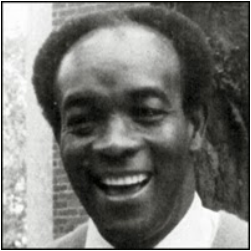|
My father taught me a very important lesson in the last days of his life. He had written a novel that had never been published, but that he loved very much. Several years ago, one afternoon, he made some audio tapes for family and friends of himself reading selections from the novel. On the tapes, he read selections from his favorite chapters, and it was a treat to hear him bring the dialogue alive. As a professor of literature, he loved language, and reading the novel aloud let him, and us, hear and enjoy the music in the words. Little did I realize, when I got my set of tapes, that these tapes would become the only way for my Dad to have a voice so many years later. In the last few days of his life, his once sonorous and melodic voice had faded to a whisper. The doctors had said they could do no more for him, so we brought him home from the hospital, and set up a hospital bed downstairs in a room we called the blue room - a room where, for years, my Dad had stayed up late marking papers or preparing for his classes. We camped out in the blue room as a family, keeping my Dad's company as he became weaker and weaker. One of us decided to get those tapes he had made so many years ago, and we played, for him, one of his favorites - a recording of the fourth chapter of his novel. It was an odd juxtaposition, hearing his robust voice emanating from the speakers while he lay there, feeble, on a hospital bed, barely able to whisper. Odd, that is, until the end of the tape, where we unmistakeably heard my Dad, in appreciation of what he had heard, whisper the word "Excellent." That was hilarious, and said so much about my Dad. He was confident in his abilities - the world had never celebrated his novel, and it had never been published, but he literally went to his grave believing that he had created something great, and he did not need anyone else to validate that for him. He was also keenly aware that writing, and the act of creating something, was its own reward - one that would be around, in some form, after he was gone.
Years later, as I was trying to figure out what types of songs to write, I remembered this experience, and arrived at an answer. In the past, I have tried to write many types of songs - some for my own amusement, others targeted at the commercial market - with varying results. Now, I ask if the song I am writing would pass what I call the "deathbed test": if I were on my deathbed, and someone played the song, would I be able to whisper, when the last note faded, "excellent"? I found this test helped me regain something I had lost sight of in my writing. Like many other developing songwriters, I can get caught up in what pleases others (be they the "public" - however that is defined - or various gatekeepers in the music industry). While I still keep an eye on this, I now also ask myself a different question: regardless of whether or not this song appeals to others, does it move me enough that, if it were one of the last things in my life that I heard, I would be proud of it? I find this helps me ensure that my writing becomes its own reward, regardless of the success or failure of any particular song. One Christmas, my Dad gave me, my wife, my sister and my Mom a copy, in a three-ring binder, of his novel. He had recently finished revising it, after having not read it for several years, and wanted each of us to have a copy. On the front of each copy, along with a holiday greeting, he had written the following message: "May these pages make you happy and make you sad; make you laugh and make you cry! But may they, above everything else, thrill and inspire you far beyond the words which are written here!" I hope the same for every song I write now. I hope you will too for your songs as well.
0 Comments
|
Archives |

 RSS Feed
RSS Feed